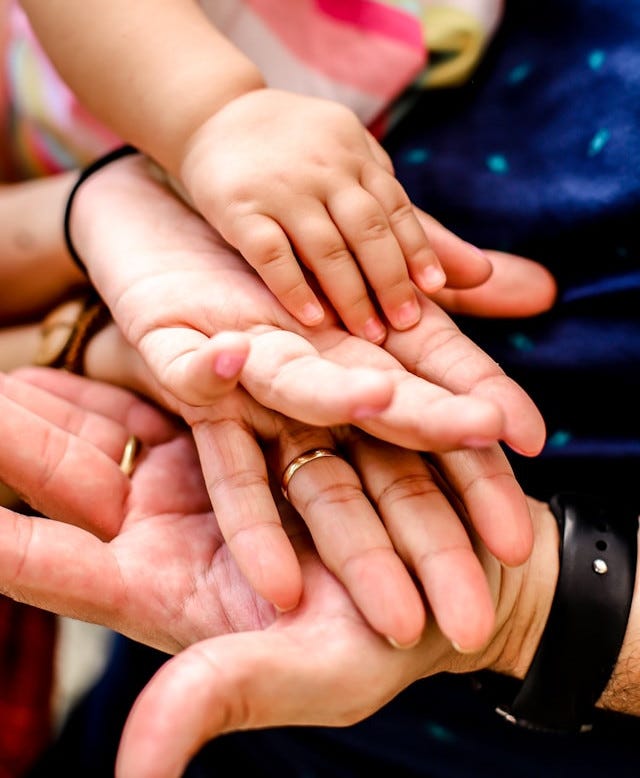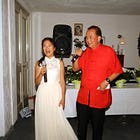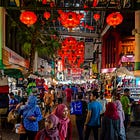Motherhood is a contradiction
Juggling motherhood, creativity, and multicultural and diaspora challenges.
Motherhood is a contradiction. One moment, I grieved the loss of my selfhood and individuality. The next, I cuddled my newborn tightly, breathed in the baby's smell, got all mushy, and felt at one with this other person. One moment, I was sad about being unable to travel at the drop of a hat anymore. The next, I started nesting like crazy, preparing my home for yet another baby.
I wanted to write and reflect on motherhood after reading a deluge of essays about1 Mother’s Day. We didn’t even celebrate it, almost forgetting while enjoying an extended weekend holiday on a farm in the Black Forest.
The spark came from the essay In Defense of Motherhood by Lindsey Stanberry In Substack, popular essays are often for creatives exploring how to be a mother while being an artist. I understand the sentiment and the story behind it. The guilt of artists continuing their work without answering to a company or a boss, or as my husband likes to say, “I signed a contract to do it”—makes a compelling contention with the demands of motherhood.
For me, this dilemma extends to personal projects, self-employment, and self-care. Writing and reading are my self-care. However, I dug myself a trench by clinging to my dream of financial freedom while working again to support my family and started exploring my creative side through writing. Did someone mention I'm complicating an already complex identity called motherhood?
Mixed feelings about motherhood have been written about almost everywhere by now. But what about being a migrant mother and an Asian mother in a multicultural setting? What is it like to be a Chinese-Malaysian mother in Germany raising mixed-culture children, having been raised by two Chinese-Malaysian mothers in Malaysia, who were themselves raised by Chinese migrant mothers?
The Chinese mothers in my life
Reflecting on motherhood, I inevitably think about the mothers in my life. My two Chinese mothers are a contradiction. One is my biological mother, Mummy, and the other is my nanny, Lai Ma, who raised me for the first five years of my life.
Mummy is unlike a typical Chinese mum, while Lai Ma is one and even more.
What are typical Chinese mums? They are those whose first question when they see you is, “Have you eaten yet?” Regardless of your answer, you’ll be offered more food because “you look so thin, you need to eat more.” Even if you have gained weight, they won’t refrain from informing you and then feed you more anyway. Don't question the logic—this is just the way! Besides that, they also think of everything to make your life better, at their discretion, of course. This kind of typical Chinese mum is my Lai Ma.
However, my Lai Ma is also much more than that. She doted on me and all the other children in her care. She is a fantastic cook and baker; one will never go hungry in her care. She shaped my foundation, setting boundaries for me and teaching me how to operate in this world without losing my sense of self. Her emphasis on respect, responsibility, and nurturing care are values I strive to impart to my children.
Since I was no longer in her care after five years old, I was probably spared from her next stage of strict upbringing, made popular by the tiger mum reference. A quick interview with my Godsister, her daughter, revealed that my Lai Ma made sure they worked hard but wasn’t focused on getting top results; she just wanted them to have a better life, which is why she encouraged and helped my Godsister to apply for studies and move to London. She was also fiercely protective. This blend of high expectations and emotional support forms the backbone of my parenting approach.
On the other hand, Mummy was a non-typical, modern Chinese mum, at least in the 80s in Malaysia. She went to work and relegated childcare to my nanny. At two months old, I was given to a nanny because my mum was overwhelmed by caring for my older sister, whom my Pho Pho (grandmother) helped with during the day. My mum did not comment on my weight (which I appreciate) or ask if I had eaten. She doesn’t cook, clean, or do much household stuff. She preferred to dress up and go to work, wearing color-coordinated custom-made clothing and shoes with heels so high, you think she will topple over at every next step. From her, I learned the importance of self-care and personal ambition, which I strive to incorporate into my life without sacrificing my role as a mother.

Me, the Chinese-Malaysian mum in Germany
Now, here I am, a Chinese-Malaysian migrant in Germany raising multi-cultural children. If you had told me this would be my life ten years ago, I would have said you have a good imagination.
So, what kind of mum am I? Am I a typical Chinese mum? That description might have changed in our current generation.
I find myself stuck between many worlds while navigating this already blurry role called mother. In some ways, I am compelled to act like a typical Chinese mum. I can’t help but notice when my children lose weight, but I refrain from mentioning it. I can’t help but try to cook all sorts of delicious food to entice them to eat more.
I make my children address every adult with the "Aunty" and "Uncle" prefixes, making the Germans feel awkward. In Germany, only family members are called Tante or Onkel. I usually proceed to explain the importance of respect for adults in my culture, which any cultured German will proudly accept.
I feel the urge for my son to learn to read as soon as possible, partly because of my love for words and partly because my nieces and children of friends back in Malaysia are reading multiple languages by age five. I believe that back home, I am perceived as the crazy Chinese-Malaysian mum who lets her children play all the time until they go to school at 6/7 years old. So, yes, I feel the pressure. I can’t help but doubt whether my child is missing out whenever I hear about the new abilities of their Asian counterparts, despite being convinced by one study that all children balance out by a certain age.2
Me, the aspiring multicultural mum
I am a mother who wants to pass on part of her Chinese heritage to her children. I insist on talking to my children in Cantonese, even though my eldest talkative son only replies in German and sometimes English. All my hopes are now on my toddler daughter, who mish-mash all three languages as she goes.
I am the mother who recreates rituals around her Chinese heritage, celebrating Lunar New Year by dressing everyone up for an exchange of Angpows (red packets with money) and taking a photo to share with family and friends in Malaysia, even if just for 10 minutes. I had earnest plans to celebrate all sorts of Chinese festivals when my first son was a baby, but now I only manage another celebration, Dongzhi3 (Winter Solstice), by making Tong Yuen dessert for everyone at my in-laws, as we are typically there waiting for Christmas.
I am the mother who hopes to break generational trauma and parent consciously. I allow my children to express all emotions, even if they trigger me, because, as a child, I wasn’t allowed to. But I don’t allow all behaviors; I want to guide them with authority without resorting to authoritarian methods, which are common in traditional Chinese parenting.4
I am a mother who wants to expand her creative endeavors. I want to write more, engage in self-love activities, and show my children that I am more than just their mother. I am me. I am a person. I want to be a role model so they can pursue their passions and be themselves. My husband suggested waiting until our youngest is more independent and we have more time before embarking on this new creative pursuit. But my heart pushes back—she is stubborn and adamant about coming through.
Motherhood is a contradiction. On one side, I want my children to embrace the beautiful parts of my Chinese culture, such as respecting older people; on the other, I want them to speak up and stand up for their own rights. On one side, I want my children to speak my mother tongue, Cantonese, to me; on the other, I want them to express themselves freely and as they wish. On one side, I want to bring my culture to my children; on the other, I want them to embrace their other part – German culture.
Please share your thoughts:
What contradictions have you faced in motherhood?
If you are a parent from/nurturing a multicultural family and/or in the diaspora, please share your personal challenges and joys.
For those who juggle creative pursuits and parenting, how do you find time and energy for both?
Conscious Living is a reader-supported publication. Finding the courage to share personal essays like this is only made possible by your support, whether through subscribing or going paid.
More from my personal essays:
Around age 10, children learning to read at seven had caught up to those learning at 5. Later starters had no long-term disadvantages in decoding and reading fluency. For whatever reason, the later starters had slightly better reading comprehension. Reading appears to be built on oral language, decoding, and reading skills. This research suggests some focus on teaching reading early could be relaxed. [source]
This parent typically develops a close, nurturing relationship with their children. They have clear guidelines for their expectations and explain their reasons associated with disciplinary actions. Disciplinary methods are used as a way of support instead of punishment. Not only can children have input into goals and expectations, but there are also frequent and appropriate levels of communication between the parent and their child. [source]
Photo by Luana Azevedo on Unsplash







“They are those whose first question when they see you is, “Have you eaten yet?” Regardless of your answer, you’ll be offered more food because “you look so thin, you need to eat more.” Even if you have gained weight, they won’t refrain from informing you and then feed you more anyway.”
Yes, that pretty much described my mom, grandmothers, aunts, … basically all the Chinese mother-figures in my life! 😃
Thanks so much for sharing your thoughts on this topic. Being raised multicultural myself, I too have had no other choice than to raise my children in a multi cultural way. I don't see it as a contradiction; it's more like a pick and choose. I make sure to integrate something from each culture I was raised in and hope they grow up to be world citizens.